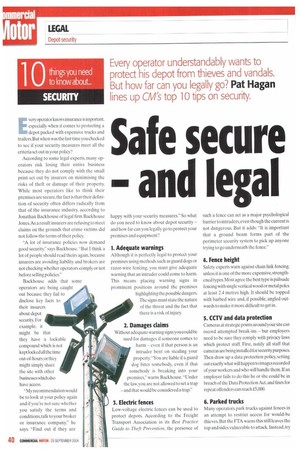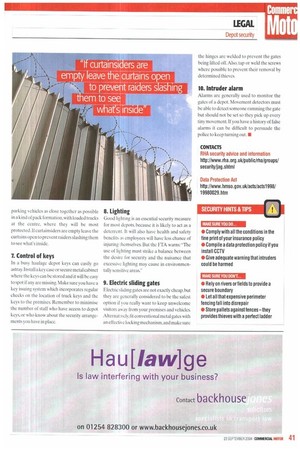Safe secure and legal
Page 40

Page 41

If you've noticed an error in this article please click here to report it so we can fix it.
Every operator understandably wants to protect his depot from thieves and vandals. But how far can you legally go? Pat Hagan
lines up CM'S top 10 tips on security.
Every operator knows insurance is important, especially when it comes to protecting a depot packed with expensive trucks and trailers. But when was the last time you checked to see if your security measures meet all the criteria set out in your policy?
According to some legal experts, many operators risk losing their entire business because they do not comply with the small print set out by insurers on minimising the risks of theft or damage of their property. While most operators like to think their premises are secure, the fact is that their definition of security often differs radically from that of the insurance industry, according to Jonathan Backhouse of legal firm Backhouse Jones. As a result insurers are refusing to meet claims on the grounds that crime victims did not follow the terms of their policy.
"A lot of insurance policies now demand good security," says Backhouse. "But I think a lot of people should read theirs again, because insurers are avoiding liability and brokers are not checking whether operators comply or not before selling policies."
Backhouse adds that some operators are being caught out because they fail to disclose key facts to their insurers about depot security. For example, it might be that they have a lockable compound which is not kept locked all the time out-of-hours; or they might simply share the site with other businesses which also have access.
"My recommendation would be to look at your policy again and if you're not sure whether you satisfy the terms and conditions, talk to your broker or insurance company," he says. "Find out if they are happy with your security measures." So what do you need to know about depot security — and how far can you legally go to protect your premises and equipment?
1. Adequate warnings
Although it is perfectly legal to protect your premises using methods such as guard dogs or razor-wire fending, you must give adequate warning that an intruder could come to harm. This means placing warning signs in prominent positions around the premises highlighting the possible dangers. The signs must state the nature of the threat and the fact that there is a risk of injury.
2. Damages claims
Without adequate warning signs you could be sued for damages if someone comes to harm — even if that person is an intruder bent on stealing your property. "You are liable if a guard dog bites somebody, even if that somebody is breaking into your premises," warns Backhouse. "Under the law, you are not allowed to set a trap — and that would be considered a trap."
3. Electric fences
Low-voltage electric fences can he used to protect depots. According to the Freight Transport Association in its Best Practice Guide to Theft Prevention. the presence of such a fence can act as a major psychological barrier to intruders, even though the current is not dangerous. But it adds: "It is important that a ground beam forms part of the perimeter security system to pick up anyone trying to go underneath the fence."
4. Fence height
Safety experts warn against chain link fencing, unless it is one of the more expensive, strengthened types. Most agree the best type is palisade fencing with single vertical wood or metal poles at least 2.4 metres high. It should be topped with barbed wire and, if possible, angled outwards to make it more difficult to get in.
5. CCTV and data protection
Cameras at strategic points around your site can record attempted break-ins — but employers need to be sure they comply with privacy laws which protect staff. First, notify all staff that cameras are being installed for security purposes Then draw up a data protection policy, setting out exactly what will happen to images recorded of your workers and who will handle them. Han employer fails to do this he or she could be in breach of the Data Protection Act, and fines for repeat offenders can reach £5,000.
6. Parked trucks
Many operators park trucks against fences in an attempt to restrict access for would-be thieves. But the FTA warns this still leaves the top and sides vulnerable to attack. Instead, try parking vehicles as close together as possible in a kind of pack formation, with loaded trucks at the centre, where they will be most protected. If curtainsiders are empty leave the curtains open to prevent raiders slashing them to see what's inside.
7. Control of keys
In a busy haulage depot keys can easily go astray. Install a key case or secure metal cabinet where the keys can be stored and it will be easy to spot if any are missing. Make sure you have a key issuing system which incorporates regular checks on the location of truck keys and the keys to the premises. Remember to minimise the number of staff who have access to depot keys, or who know about the security arrangements you have in place.
8. Lighting
Good lighting is an essential security measure for most depots, because it is likely to act as a deterrent. It will also have health and safety benefits as employees will have less chance of injuring themselves. But the FTA warns: "The use of lighting must strike a balance between the desire for security and the nuisance that excessive lighting may cause in environmentally sensitive areas."
9. Electric sliding gates
Electric sliding gates are not exactly cheap. but they are generally considered to be the safest option if you really want to keep unwelcome visitors away from your premises and vehicles. Alternatively, fit conventional metal gates with an effective locking mechanism,and make sure the hinges are welded to prevent the gates being lifted off. Also, tap or weld the screws where possible to prevent their removal by determined thieves.
10. Intruder alarm
Alarms are generally used to monitor the gates of a depot. Movement detectors must be able to detect someone ramming the gate but should not be set so they pick up every tiny movement. If you have a history of false alarms it can be difficult to persuade the police to keep turning out. •




























































































































































































